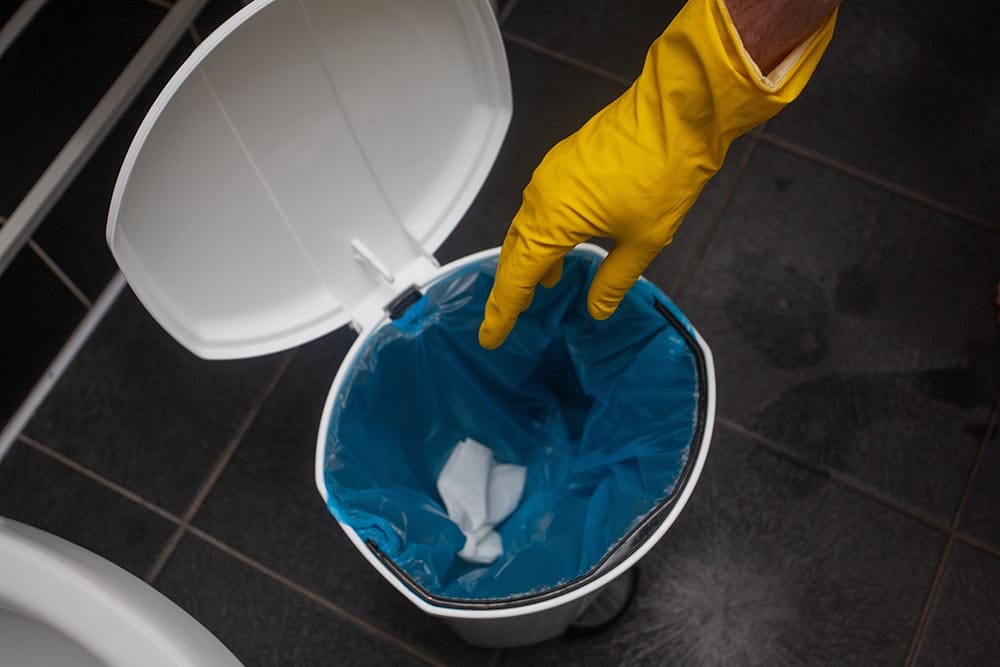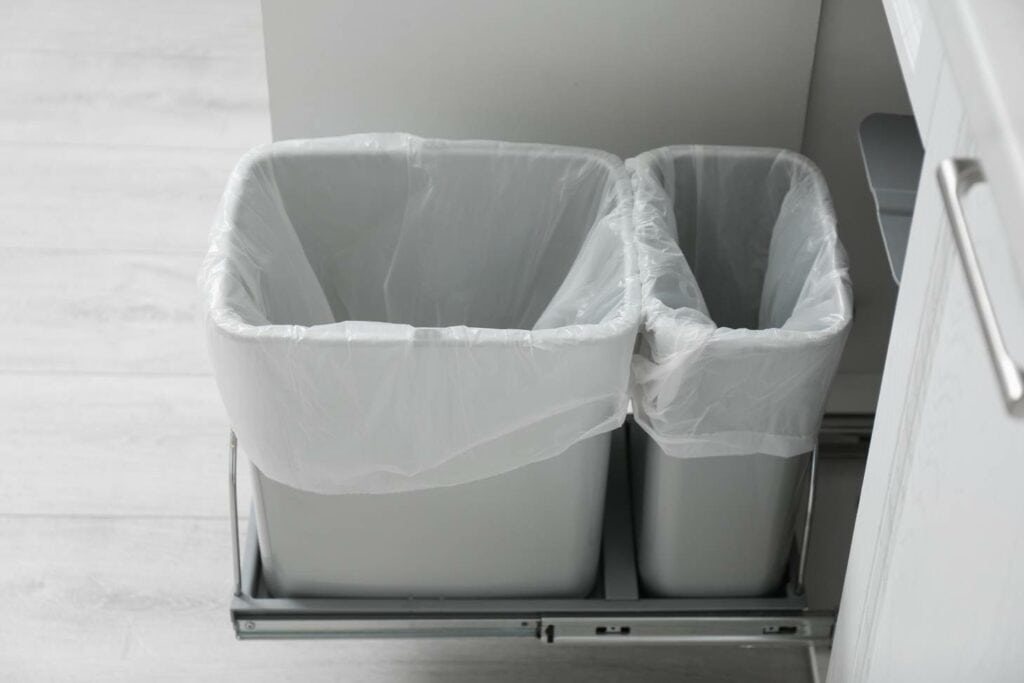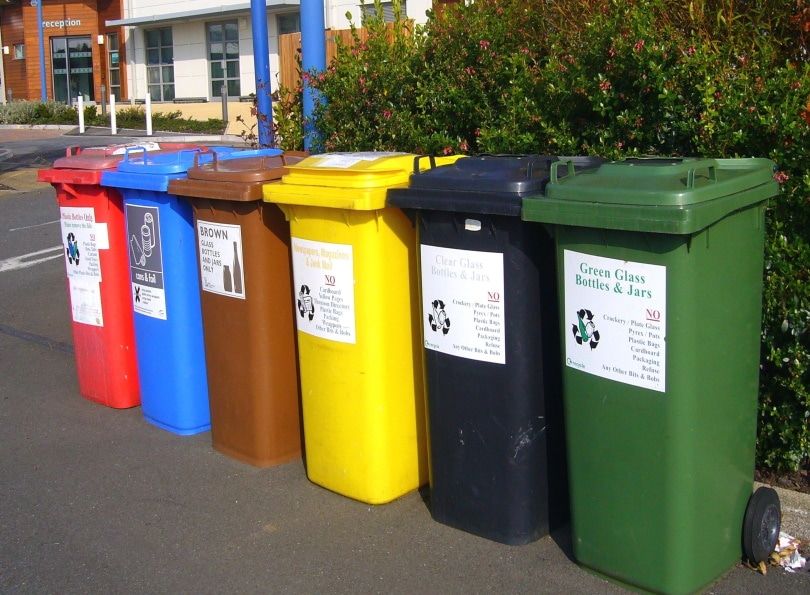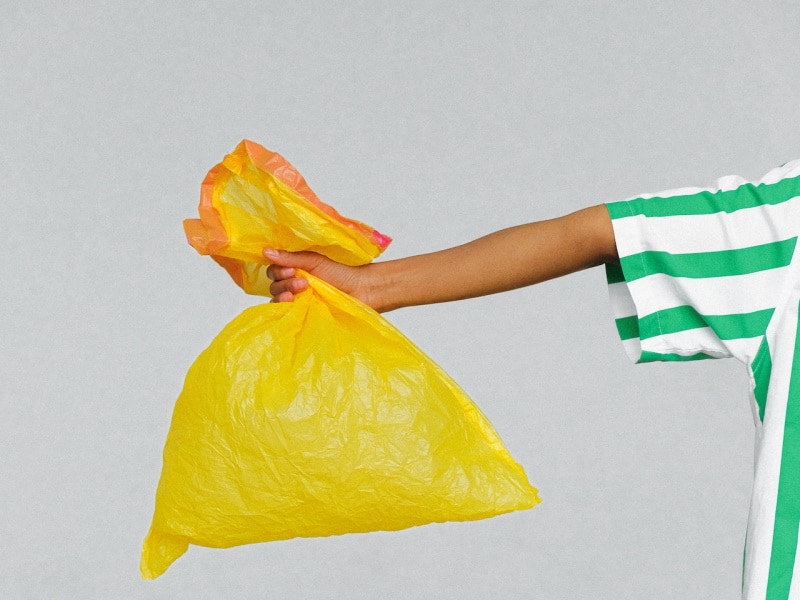Can You Recycle Trash Bags? Complications, Disposal & Process
-
Pete Ortiz
- Last updated:

Trash bags play an important role in our lives. They collect all the waste (mostly organic) and help us get rid of it quickly and hassle-free. But are these bags recyclable? Can you put them in a standard container or not? Well, here’s the deal: disposable bags can, indeed, be recycled, but not in a curbside bin. That’s because most facilities are not equipped to handle plastic film.
How do you dispose of them, then? Fortunately, there is a tried-and-true solution. Just visit the closest drop-off location in the area and leave all of your plastic goods there. We’re talking about recycling bins near retail and grocery stores, of course. Are there any alternatives? Are compostable bags better? Let’s find out!
What Is Recycling? Why Is It Important?
When waste is converted into new materials/objects, we call that recycling. To turn organic waste into compost, we put it in a pile, add water and worms and give it time to degrade. With inorganic waste, things are a bit more complicated. Collecting old batteries, paper, glass, and metal into a pile won’t do any good. First, none of that stuff will turn into an amendment for the soil, no matter how long it stays in the ground.
Second, inorganic waste is a burden for Mother Nature and hurts plant growth, among other things. This is why world governments are committed to the idea of building more recycling facilities around the globe. These facilities sort, clean, and transform recyclables into useful materials that various industries can use. The recycling industry creates new jobs, boosts the economy, and makes a pollution-free future possible.
What’s a Trash Bag? How Does It Work?

Manufactured back in 1950 by Harry Wasylyk, a trash bag is exactly that: a bag we use for trash. Also known as a garbage/bin bag, it is specifically designed to contain solid waste. Trash bags are cheap, lightweight, easy to produce, and (relatively) tear-resistant. All you have to do is put it into a waste container to keep it clean and throw the bag away once it gets full.
Trash bags are the most popular means of disposing of household waste in the US, Canada, and most of the world. They’re crafted from plastic (low/high-density polyethylene) and easily adapt to the shape of a trash container. Unfortunately, bio-based plastic is not biodegradable¹. You can’t put it in a compost pile and expect bacteria to chew through it in a month or two. It takes a VERY long time to break down.
Trash Bag Recycling: Can You Do It Or Not?
Most recycling facilities in the US aren’t equipped well enough to process plastic film. There, it’s not recommended to put trash bags in regular bins as that will create a big headache for the folks working at those facilities. Now, waste can either be burned, composted, degraded, or recycled. With polyethylene, composting or degrading is not an option. Burning it will release pollutants into the atmosphere.
On a large, industrial scale, burning polyethylene generates dangerously high levels of microplastics, bisphenols, and phthalates¹. So, that means the trash bags won’t be burned, either. The only option on the table is recycling, but again, that requires specific equipment. And that’s exactly why there are so many plastic bags scattered all over landfills. For example, in Canada, only 9% of plastic is recycled.

Disposing of Trash Bags: A Detailed Guide
So, now that we know trash bags are hard to recycle, let’s see how we can get rid of them the proper way. There are lots of dedicated drop-off locations around the country that will gladly accept your bags. Essentially, it will be a big bin with a “for recycling” tag on it. Look for such a bin near grocery and retail stores like Walmart, Wegmans, and Lidl—they’ll gladly take the bags off your hands.
Having a hard time finding one in your city? Don’t worry: there are lots of apps for Smartphones and sites that can instantly pinpoint all the available collection bins in the area. Now, it would be best to call up-front before hopping into the car. Chances are, they’re not available at the moment, and you’ll be wasting time driving there.
Drop-Off Points: What Materials Do They Accept?
Most bags and wraps made of plastic film are recyclable at these drop-off locations. However, there are some exceptions to the rule, and it’s very important to know about them. The reason: not all plastics out there are made from the same materials/chemical compositions. Some stuff made of the “wrong” type of plastic can have a bad impact on the recycling process.
- Bags for groceries produce, bread, and cereal. Even zipper sandwich bands are safe for these bins.
- Wrap. It’s the thin plastic film that’s usually wrapped around packs of soda, diapers, toilet paper, and diapers.
- Pouches. If you’ve ever ordered from Amazon, you probably have one or two of these at home.
- Air pillows for cushion packaging of fragile items are accepted at drop-off spots as well.
- Clinging plastic wrap. It’s manufactured from PVC and does a great job of keeping food fresh. However, it’s a bad fit for drop-offs.
- Salad bags. Sustainable diets are great, but the bags that most salad mixes are sold in are not welcome here.
- Candy wrappers. If you have a sweet tooth, you probably have lots of candy wrappers at home. Sadly, you can’t recycle them.
- Bags for pet food. These bags are lined with layers of plastic or paper. If you can separate them, recycling will be an option. Otherwise, it’s a big no.
- Compostable bags. This might sound a bit strange, but retail store drop-off bins don’t accept compostable bags!
A quick note: you don’t have to return plastic bags to the same stores that you bought them from. Drop-off locations will accept your plastic waste no matter where it came from, be it a “rival” store or even an online purchase. In this case, it’s much more important to know which items are allowed and which are not.

Getting the Bags Ready for Dropping Off
You’ve probably noticed the “Recycle if clean and dry” tag on plastic bags that you get at grocery stores. Well, it’s not there for nothing. Make sure to clean the bags and dry them before you arrive at a drop-off spot. Liquid, food residue, and crumbs can contaminate the bin, making tons of plastic non-recyclable. Don’t worry: there’s no need to air-dry each and every bag or wrap.
Still, do give the plastic film some time to dry and shake it a bit to get rid of all the crumbs. Now, when there’s too much residue that you can’t (or don’t want to) clean, it shouldn’t even be recycled. Also, watch out for any paper labels. Paper doesn’t go well with drop-off bins. So, take a moment to remove it and put it in a regular recycling bin. If peeling off the labels turns into a challenge, don’t hesitate to use scissors.
How Do They Process Plastic Bags?
When trash bags arrive at recycling facilities, they are cut into shreds and then turned into pellets. This allows them to recycle, reprocess the plastic, and turn it into something new. Old bags don’t necessarily have to be turned into new bags. Essentially, once the plastic is broken down, it can be converted into dozens of different things.
Are There Any Alternatives?
In the US, 99% of trash bags are black, which are the ones that don’t do well in compost bins or standard recycling facilities. The good news is—you can always go with blue or green bags. Often called reusable, blue bags are specifically made for recycling. That means you can put them in the recycle bin and contribute to an eco-friendly future. As for the green ones, they are biodegradable.
Also known as compostable bags, they are perfect for collecting organic waste from the kitchen. Crafted from sustainable materials (mostly plant-based), these bags will decompose in 3–6 months. Worms in a compost bin will happily feed on them (in contrast to most plastic bags), speeding up the process. OK Compost and BPI-certified bags¹ are leading the market right now.
Conclusion
What do we need trash bags for? It’s obvious: to contain waste. However, it’s not recommended to put these bags into recycling bins. You might be driven by noble motives, but by doing so, you’ll cause more harm than good. Lucky for us, there is a 100% safe and government-backed way of disposing of trash bags without damaging the environment.
Find a drop-off location for plastic film in your area (like maybe use a dedicated app for that), deliver all the garbage bags that you’ve got piled up back at home, and call it a day! True, this can be a bit tiresome at times, especially if there are no drop-off spots in the vicinity, but it will be well worth it!
You Might Also Be Interested In:
- Are Paper Bags Recyclable? How Do You Properly Dispose of Them?
- Why is Recycling Important?
- Can You Recycle Candle Jars?
- What’s in a bag?
- What Are Garbage Bags Made of
- Recycling Bags for your Recycling Bin
- Decomposing Biodegradable Bags
- FAQ
- Plastic Packaging History
- Burning plastic can affect air quality, public health
- Plastic waste and pollution reduction
- Recycling Basics
- What is Walmart doing about plastic waste?
- What can be recycled through Store Drop-Off?
- Drop-Off Directory
- https://www.epa.gov/recycle/recycling-basics
- https://www.plasticsmakeitpossible.com/about-plastics/history-of-plastics/plastic-innovations-in-packaging-through-the-decades/
- https://www.aaapolymer.com/can-liner-materials/
- https://www.canada.ca/en/environment-climate-change/services/managing-reducing-waste/reduce-plastic-waste.html
- https://www.recycling.com/recycling-bags/
- https://www.sciencefocus.com/science/how-long-do-biodegradable-bags-take-to-decompose/
Featured Image Credit: Artmim, Shutterstock
Contents



